Related Research Articles
Professional certification, trade certification, or professional designation, often called simply certification or qualification, is a designation earned by a person to assure qualification to perform a job or task. Not all certifications that use post-nominal letters are an acknowledgement of educational achievement, or an agency appointed to safeguard the public interest.

A respiratory therapist is a specialized healthcare practitioner trained in critical care and cardio-pulmonary medicine in order to work therapeutically with people who have acute critical conditions, cardiac and pulmonary disease. Respiratory therapists graduate from a college or university with a degree in respiratory therapy and have passed a national board certifying examination. The NBRC is responsible for credentialing as a CRT, or RRT,
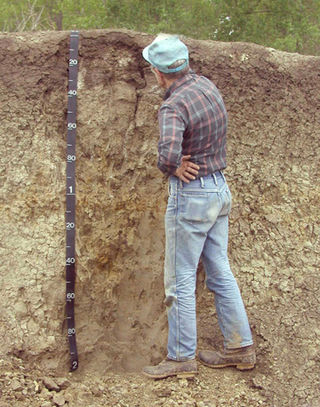
Soil science is the study of soil as a natural resource on the surface of the Earth including soil formation, classification and mapping; physical, chemical, biological, and fertility properties of soils; and these properties in relation to the use and management of soils.

A psychologist is a professional who practices psychology and studies mental states, perceptual, cognitive, emotional, and social processes and behavior. Their work often involves the experimentation, observation, and interpretation of how individuals relate to each other and to their environments.
Professional development, also known as professional education, is learning that leads to or emphasizes education in a specific professional career field or builds practical job applicable skills emphasizing praxis in addition to the transferable skills and theoretical academic knowledge found in traditional liberal arts and pure sciences education. It is used to earn or maintain professional credentials such as professional certifications or academic degrees through formal coursework at institutions known as professional schools, or attending conferences and informal learning opportunities to strengthen or gain new skills.
Regulation and licensure in engineering is established by various jurisdictions of the world to encourage life, public welfare, safety, well-being, then environment and other interests of the general public and to define the licensure process through which an engineer becomes licensed to practice engineering and to provide professional services and products to the public.
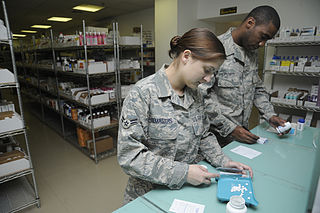
A pharmacy technician performs pharmacy-related functions. Training, certification, licensing, and actual practice of pharmacy technicians varies not only worldwide but in some countries regionally as well as by employer.
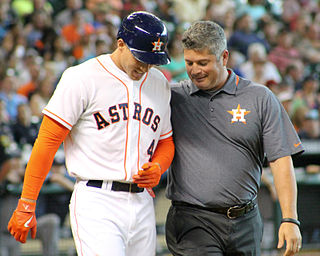
An athletic trainer is a certified and licensed health care provider who practices in the field of sports medicine. Athletic training has been recognized by the American Medical Association (AMA) as an allied health care profession since 1990.

The secretary of state is an official in the state governments of 47 of the 50 states of the United States, as well as Puerto Rico and other U.S. possessions. In Massachusetts, Pennsylvania, and Virginia, this official is called the secretary of the commonwealth. In states that have one, the secretary of state is the chief administrative officer of the state and is often the primary custodian of important state records. In the states of Alaska, Hawaii, and Utah, there is no secretary of state; in those states many duties that a secretary of state might normally execute fall within the domain of the lieutenant governor. Like the lieutenant governor, in most states, the secretary of state is in the line of succession to succeed the governor, in most cases immediately behind the lieutenant governor. In three states with no lieutenant governor as well as the U.S. territory of Puerto Rico, the secretary of state is first in the line of succession in the event of a gubernatorial vacancy.

A Medical Laboratory Scientist (MLS) or Clinical Laboratory Scientist (CLS) or Medical Technologist (MT) is a licensed Healthcare professional who performs diagnostic testing of body fluids, blood and other body tissue. The Medical Technologist is tasked with releasing the patient results to aid in further treatment. The scope of a medical laboratory scientist's work begins with the receipt of patient or client specimens and finishes with the delivery of test results to physicians and other healthcare providers. The utility of clinical diagnostic testing relies squarely on the validity of test methodology. To this end, much of the work done by medical laboratory scientists involves ensuring specimen quality, interpreting test results, data-logging, testing control products, performing calibration, maintenance, validation, and troubleshooting of instrumentation as well as performing statistical analyses to verify the accuracy and repeatability of testing. Medical laboratory scientists may also assist healthcare providers with test selection and specimen collection and are responsible for prompt verbal delivery of critical lab results. Medical Laboratory Scientists in healthcare settings also play an important role in clinical diagnosis. An estimated 70% of medical decisions are based on laboratory test results and MLS contributions affect 95% of a health system's costs.
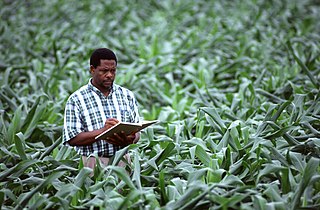
An agriculturist, agriculturalist, agrologist, or agronomist is a professional in the science, practice, and management of agriculture and agribusiness. It is a regulated profession in Canada, India, the Philippines, the United States, and the European Union. Other names used to designate the profession include agricultural scientist, agricultural manager, agricultural planner, agriculture researcher, or agriculture policy maker.

Agricultural soil science is a branch of soil science that deals with the study of edaphic conditions as they relate to the production of food and fiber. In this context, it is also a constituent of the field of agronomy and is thus also described as soil agronomy.

The National Cooperative Soil Survey Program (NCSS) in the United States is a nationwide partnership of federal, regional, state, and local agencies and institutions. This partnership works together to cooperatively investigate, inventory, document, classify, and interpret soils and to disseminate, publish, and promote the use of information about the soils of the United States and its trust territories. The activities of the NCSS are carried out on national, regional, and state levels.
A professional technologist (P.Tech) is a class of certification of engineering technologist and professional technologist in Canada and Malaysia respectively.
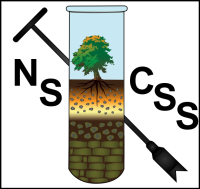
The National Society of Consulting Soil Scientists (NSCSS) was integrated into the Soil Science Society of America as of August 2011. NSCSS was a scientific and professional society of soil scientists, principally in the U.S. but with non-U.S. members as well. Members engaged primarily in environmental consulting, but consulting was not a requirement of membership, and the member body included soil science educators as well as government soil scientists. Society consulting soil scientists provided professional services in the form of agricultural and environmental consulting with respect to using soil as a natural resource, especially as it relates to nutrient management, waste management, septic systems, wetlands, erosion, slope stability, land use planning, and land degradation.

Health professional requisites refer to the regulations used by countries to control the quality of health workers practicing in their jurisdictions and to control the size of the health labour market. They include licensure, certification and proof of minimum training for regulated health professions.
Engineering law is the study of how engineering ethics and legal frameworks are adopted to ensure public safety surrounding the practice of engineering.
Geoprofessions is a term coined by the Geoprofessional Business Association to connote various technical disciplines that involve engineering, earth and environmental services applied to below-ground ("subsurface"), ground-surface, and ground-surface-connected conditions, structures, or formations. The principal disciplines include, as major categories:

Geological engineering is a discipline of engineering concerned with the application of geological science and engineering principles to fields, such as civil engineering, mining, environmental engineering, and forestry, among others. The work of geological engineers often directs or supports the work of other engineering disciplines such as assessing the suitability of locations for civil engineering, environmental engineering, mining operations, and oil and gas projects by conducting geological, geoenvironmental, geophysical, and geotechnical studies. They are involved with impact studies for facilities and operations that affect surface and subsurface environments. The engineering design input and other recommendations made by geological engineers on these projects will often have a large impact on construction and operations. Geological engineers plan, design, and implement geotechnical, geological, geophysical, hydrogeological, and environmental data acquisition. This ranges from manual ground-based methods to deep drilling, to geochemical sampling, to advanced geophysical techniques and satellite surveying. Geological engineers are also concerned with the analysis of past and future ground behaviour, mapping at all scales, and ground characterization programs for specific engineering requirements. These analyses lead geological engineers to make recommendations and prepare reports which could have major effects on the foundations of construction, mining, and civil engineering projects. Some examples of projects include rock excavation, building foundation consolidation, pressure grouting, hydraulic channel erosion control, slope and fill stabilization, landslide risk assessment, groundwater monitoring, and assessment and remediation of contamination. In addition, geological engineers are included on design teams that develop solutions to surface hazards, groundwater remediation, underground and surface excavation projects, and resource management. Like mining engineers, geological engineers also conduct resource exploration campaigns, mine evaluation and feasibility assessments, and contribute to the ongoing efficiency, sustainability, and safety of active mining projects
References
- ↑ "MDAC - Bureau of Plant Industry". Archived from the original on 2006-05-12. Retrieved 2006-04-01.